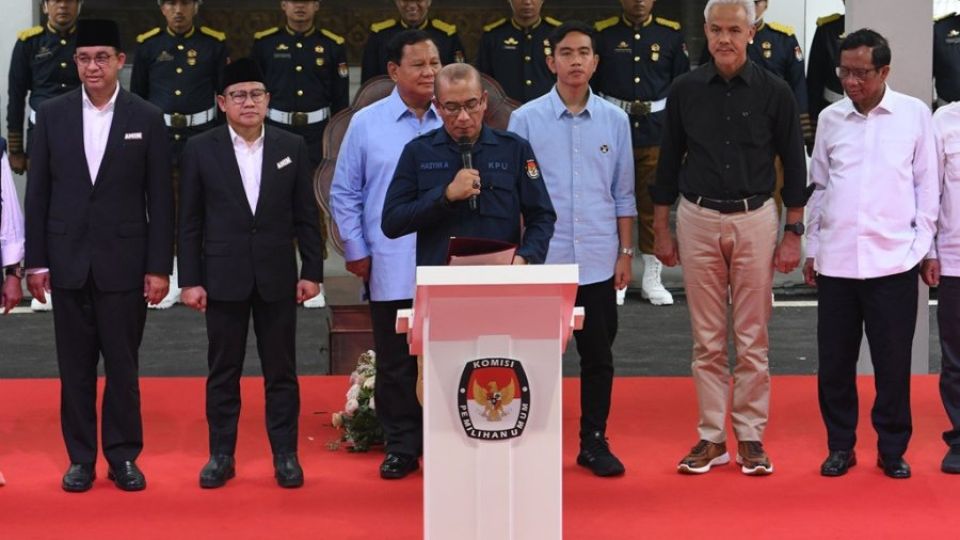December 7, 2023
JAKARTA – The pressure is on for the General Elections Commission (KPU) to be decisive about its hosting of the official 2024 election debates, amid a lack of clarity over the format and low trust in the commission’s perceived neutrality.
Some seventy days before one of the world’s biggest single-day elections commences in Indonesia, voters are keen to follow the five scheduled televised debates to form their opinion of who to vote for next year.
The first of the debates will be held next Tuesday and will feature the three candidates challenging one another over their campaign platforms on national TV.
However, concerns have arisen among some election candidates and election watchdogs, after KPU chief Hasyim Asy’ari announced abrupt changes to the debate’s format, potentially contravening existing regulations.
Hasyim implied last week that all five debates would feature both presidential and vice presidential candidates as opposed to three presidential debates and two vice presidential debates, as is mandated by law.
While the law does not specify the technicalities of hosting a debate, tradition dictates that both presidential and vice presidential candidates would at one point be given separate opportunities to challenge their counterparts, making for a level playing field.
In 2019, for instance, two rounds of presidential debates were followed by one round featuring their running mates, before the candidate pairs faced off against one another in the two final debates.
The KPU appeared to walk back on its suggested changes, with Hasyim noting that the decision was not yet final and that the commission would convene with the three candidate pairs on Wednesday.
It remains unclear when the commission will announce its final decision about the format.
“[We] plan to discuss the debate’s format, the themes to be raised, the panelists and the moderators [tomorrow],” Hasyim told reporters in Jakarta on Tuesday.
Pointing fingers
The KPU’s initial suggestion that it would eliminate vice presidential candidates from the debates, and the follow-up suggesting it would retain the vice presidential debate, has raised eyebrows and even led some to speculate whether election officials were acting in favor of certain candidates.
The Ganjar Pranowo–Mahfud MD camp, for instance, argued that the vice presidential debates are required to let the voters assess “whether the next vice president would be fit to assume the presidency in an emergency”, said Ganjar’s campaign spokesperson Chico Hakim.
“In that case, the competency of the vice president must be at least almost equal to that of the president, and one of the platforms that would allow voters to assess that aspect is the vice presidential debate,” Chico told The Jakarta Post on Tuesday.
Chico said that eliminating the vice presidential debate would be beneficial to Gibran Rakabuming Raka, running mate to presidential candidate Prabowo Subianto, as it would preclude him from going head-to-head in a debate with seasoned politician Mahfud, Ganjar’s running mate.
The confusion over the debate format has also left the Anies Baswedan–Muhaimin Iskandar campaign team and that of Prabowo and Gibran bickering over whose fault it is that the KPU suddenly made such changes.
Prabowo’s camp dismissed any insinuation that they had courted the KPU and instead alleged that it was Anies’ camp who originally suggested that all debates be contested by the main candidate and his running mate.
“We are prepared, whatever the format will be,” said Dradjad H. Wibowo, spokesman of Prabowo’s campaign team, on Tuesday.
Anies’ campaign team also deflected the blame, noting that it had only suggested that both presidential and vice presidential candidates must all be present during all of the debates, even if they were not there to contest.
Anies campaign team spokesperson Nihayatul Wafiroh also made clear that it has rejected the Prabowo camp’s suggestion to have the debate only focus on the election platforms and eliminate sections in which the candidates could engage in open debate on proposed issues or go after their opponents’ arguments.
Unprofessional
Analysts have considered the KPU’s plan to change the rules of the game without a convincing argument as a blunder, warning that the faux pas might cast a dark shadow of doubt over the commission’s capacity to carry out the next stages of the election process.
The “fatal” move to announce a premature, unfinalized and polarizing change has granted voters the right to question the body’s competency as the country’s election authority, election observers have said.
“There is a deterioration of professionalism among election officials. They have had since April 2022 to plan this – there is no justification for creating last-minute policies,” said Titi Anggraini, a senior advisory of the Association for Elections and Democracy (Perludem) watchdog, in an interview with the Post.
“Ethically they have failed to provide credible information about the elections during a critical stage.”
Tripping over technicalities when there were other more complicated tasks to undertake, such as organizing the distribution of over one million ballot papers to more than 800,000 polling stations, has justifiably put the commission under fire, she added.
Other observers pointed out that the KPU should have been more sensitive about the public’s perceived distrust in the election process, especially after the controversial Constitutional Court decision in October that cleared the path for Gibran to run, despite not being eligible.
Then-chief justice Anwar Usman was removed from the court’s leadership position after he was found guilty of a severe ethics violation when he bent the rules to allow his nephew to run. Even then, allegations that the Prabowo-Gibran pair continued receiving unjust support from the state apparatus continued to take hold.
“This speculative controversy will only injure a certain candidate and the commission itself, whose neutrality and professionalism are now under scrutiny,” said Hadar Nafis Gumay of the Network for Democracy and Electoral Integrity, in a comment made to the Post.
He said the KPU should clarify its final decision on the debate format to restore whatever is left of public trust.


